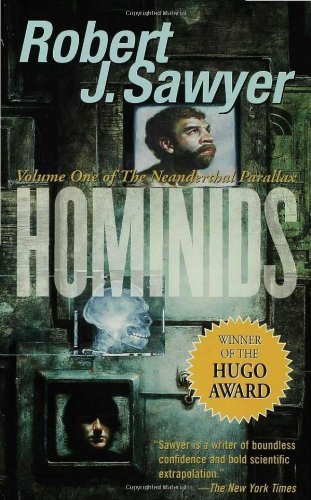rachelmanija (![[personal profile]](https://www.dreamwidth.org/img/silk/identity/user.png) rachelmanija) wrote2025-08-14 10:30 am
rachelmanija) wrote2025-08-14 10:30 am
Entry tags:
Hominids, by Robert Sawyer

A Neanderthal from an alternate universe where Homo Sapiens went extinct and Neanderthals lived into the present day is sucked into our world due to an experiment gone wrong. The book follows his interactions with humans in one storyline, and the repercussions in Neanderthal World in another.
I picked up this book because I like Neanderthals and alternate dimensions that aren't about relatively recent history (ie, not about "What if Nazis won WWII?"). The parts of the book that are actually about Neanderthal World are really fun. It's a genuinely different society, where men and women live separately for the most part, surveillance by implanted computers prevents most crime, mammoths and other large mammals did not go extinct, there are back scratching posts in homes, they wear special eating gloves rather than using utensils or eating barehanded, etc. This was all great.
The problem with this book was everything not directly about Neanderthal society. Bizarrely, this included almost the entire plotline on Neanderthal World, which consisted of a murder investigation and trial of the missing Neanderthal's male partner (what we would call his husband or lover), which was mostly tedious and ensured that we see very little of Neanderthal society. The Neanderthal interactions on our world were fun, but the non-Neanderthal parts were painful. There is a very graphic, on-page stranger rape of the main female character, solely so she can realize that Neanderthal dude is not like human men. There's two sequels, which I will not read.
It got some pretty entertaining reviews:
"☆☆☆☆☆1 out of 5 stars.
No. JUST NO.
I am sorry, but the premise of inherently and innately peaceful cultures with more advanced technology than conflict-driven cultures is patently absurd. Read Alistair Reynolds' Century Rain for an examination of how technological advancement depends on strife: necessity is the mother of invention, and the greatest necessity of all is fighting for survival. I will not be lectured for my male homosapien hubris by a creature that would never have gotten past the late neolithic in technology."
Hominids won a Hugo! Here are the other nominees.
1st place: Hominids by Robert J. Sawyer (Canadian)
2nd place: Kiln People by David Brin (American)
3rd place: Bones of the Earth by Michael Swanwick (American)
4th place: The Scar by China Miéville (British)
5th place: The Years of Rice and Salt by Kim Stanley Robinson (American)
Amazingly, I have read or attempted to read all of them. My ratings:
1st place: Bones of the Earth by Michael Swanwick (American)
2nd place: The Scar by China Miéville (British).
3rd place: The Years of Rice and Salt by Kim Stanley Robinson (American)
4th place: Hominids by Robert J. Sawyer (Canadian)
5th place: Kiln People by David Brin (American)
If I'd voted, it would be very close between Bones of the Earth and The Scar, both of which I loved. I made a valiant attempt at The Years of Rice and Salt. Like all of KSR's books, I'm sure it's quite good but not for me. I know I read Kiln People but recall literally nothing about it, so I'll give Hominids a place above it for having some nice Neanderthal stuff.
The actual ballot is a complete embarrassment.



